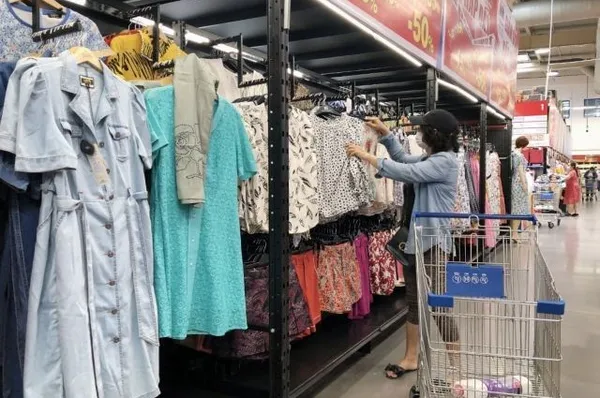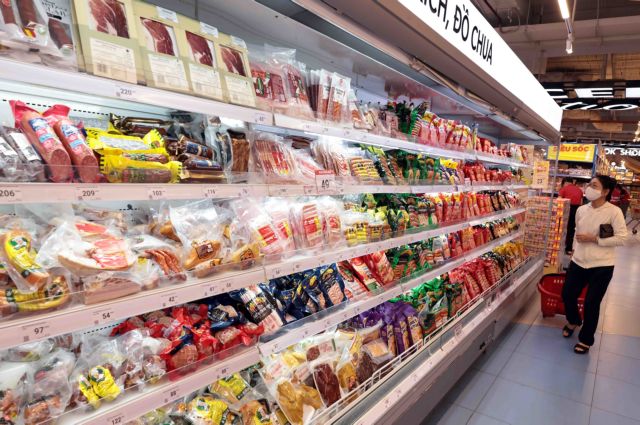 Economy
Economy

 |
| A customer shops at WinMart Thăng Long store in Hà Nội. WinCommerce, WinMart's parent company, aims to have more than 4,000 physical stores across the country by year end. — VNA/VNS Photo Khánh Vy |
HÀ NỘI — As the domestic retail market is forecast to maintain growth until the end of the year, retail groups and businesses are jumping at the opportunity for expansion and finding new ways to attract customers.
Statistics from the Ministry of Industry and Trade showed total retail sales of goods and services continued to grow each month from the beginning of the year, a sign that the economy is growing.
The retail sales of goods reached nearly VNĐ3.2 trillion (US$142.8 million) for the first eight months of the year, up 7.9 per cent against the same period last year.
The country’s private consumption accounted for 70 per cent of GDP in 2024, which is relatively high compared to other countries in the region.
Strong consumption should be encouraged as it motivates businesses to improve their production, products and services to higher standards, economic experts have said.
Major retail chains have been taking advantage of this upward trend, reorganising their stores and taking advantage of online retail platforms to increase revenue.
WinCommerce general director Nguyễn Thị Phương said the company is raising the number of physical stores – WinMart, WinMart+ and WIN – across the country.
“By the end of March we had 3,667 supermarkets and stores nationwide. We aim to have more than 4,000 by the end of the year,” she said at the annual meeting with shareholders of WinCommerce’s parent company, Masan Group.
The Bách Hóa Xanh (Green Department Stores) chain added two new stores to their network in May after a long period of closing down loss-making ones, increasing their total stores to 1,698 nationwide.
A new FujiMart supermarket was launched in Hà Nội’s Ba Đình District in June, increasing the total of stores by the Japanese group Sumimoto in the capital city to 11.
Construction started on a new AEON mall in the southern province of Long An in late May. It is going to be the eighth mall by the Japanese retail giant Aeon Group in Việt Nam, with operations expected to begin in late 2025.
AEON Việt Nam general director Furusawa Yasuyuki said the company was looking to diversify their store models and sizes.
“We will not only be making changes to the existing AEON malls but also adding new AEON shops to our partners’ shopping malls,” he said.
Smaller businesses such as the Kon Tum Cordyceps Mushroom Cultivation Cooperative in the Central Highlands are also finding ways to boost sales.
Business has not been going well for the company in the last few months, as their products are not essential goods. However, despite having stopped selling through physical retail shops, the company is trying to generate leads online through social media and e-commerce platforms, according to director Đoàn Quốc Anh Khôi.
“We are trying to utilise social media platforms such as Facebook, Zalo, TikTok Shop and e-commerce platforms such as Shopee and Lazada,” Khôi said.
“We run advertisements and do livestreams to introduce our products to platform users,” he added.
“Sales have been slow but we still have to try our best, because selling online is a trend now and buying online is the customers’ habit.”
 |
| A livestream session by a company which produces and sells agricultural products in Nam Định Province. Local businesses are taking advantage of social media and e-commerce platforms to generate leads online. VNA/VNS Photo Nguyễn Lành |
According to Nguyễn Đức Anh, chair of the Association of Vietnam Retailers (AVR), Việt Nam’s retail market was valued at $142 billion and estimated to increase to $350 billion next year. The market has a huge potential to grow further if the State offers support.
“Goods producers and distributors should be given practical preferential treatments, such as direct deduction on rental prices,” he said.
On the macro level, suppliers across the country should be connected in a way that enables them to capitalise on their strengths and complement and collaborate with each other instead of competing unfairly, he added.
Collaboration should also be fostered across sectors to nurture the economy as a whole, not only within a sector. “For example, tourism should work with trade so they both can grow,” he said.
Science and technology should be an indispensable part of agricultural production. There should be designated areas for growing crops so the produce’s quality can be controlled, ensuring health and safety for consumers, Anh added. — VNS




